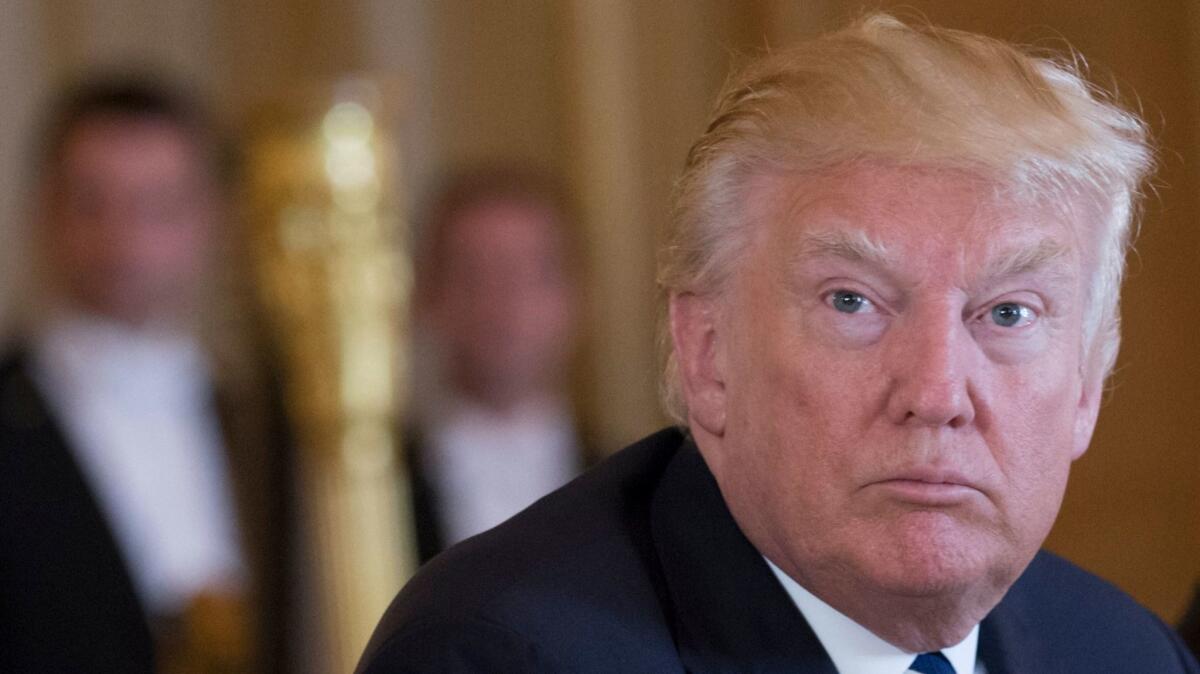Editorial: Even Donald Trump should know you don’t interfere with a federal investigation

- Share via
As a newcomer to politics, Donald Trump may have entered the White House with some misconceptions about the limits of his authority as president. That’s understandable.
But the notion that the president may not interfere with or seek to discredit investigations by the FBI of his political associates isn’t some arcane detail. It’s an obvious inference from the Constitution’s command that the president “shall take care that the laws be faithfully executed.”
Nevertheless, allegations continue to surface that President Trump sought to undermine investigations of his associates and his campaign. On Monday, for instance, the Washington Post reported that, after former FBI Director James B. Comey told Congress the bureau was investigating possible “coordination” between Russia and the Trump campaign, the president asked Director of National Intelligence Daniel Coats and National Security Agency Director Adm. Michael S. Rogers to publicly deny that there was any evidence of such a connection. (Trump has dismissed the notion of collusion as a “total hoax.”)
The Post reported that the two officials refused to comply with the president’s request. On Tuesday, Coats declined to comment when asked about the story at a Senate Armed Services Committee hearing but added, significantly, that any “political shaping” of intelligence would be inappropriate. “I have made my position clear on that to this administration,” he said.
Meanwhile, the New York Times reported last week that Comey had described a conversation in February in which Trump asked him to drop the investigation of Michael Flynn, Trump’s former national security advisor who was fired for misleading Vice President Mike Pence about a conversation he had with the Russian ambassador. Comey did not drop the probe, and earlier this month, Trump fired him.
The White House disputed the New York Times story, insisting that that “the president has never asked Mr. Comey or anyone else to end an investigation, including any investigation involving Gen. Flynn.”
Still, allegations that Trump has sought to interfere in the investigation are beginning to mount (as are new reports about Russian efforts to influence the 2016 campaign). The Justice Department, to its credit, has now assigned responsibility for the Trump-Russia investigation to a special counsel, former FBI Director Robert S. Mueller III. Mueller must seek to determine not only whether there was collusion between the Russians and the Trump campaign, but also whether Trump attempted improperly to interfere with the probe in any way.
Without prejudging the outcome of Mueller’s investigations, we would urge the president going forward to refrain from any conduct that could be construed as an attempt to influence investigations that touch on his own conduct or that of his campaign or his associates. Interfering in a federal investigation is a serious offense, as even a political novice should know. We suspect that any lawyer he consults during this political crisis will tell him the same.
Follow the Opinion section on Twitter @latimesopinionand Facebook
More to Read
A cure for the common opinion
Get thought-provoking perspectives with our weekly newsletter.
You may occasionally receive promotional content from the Los Angeles Times.










